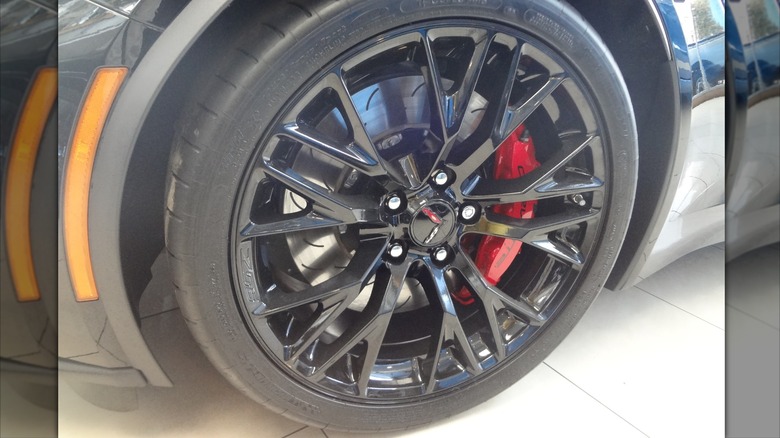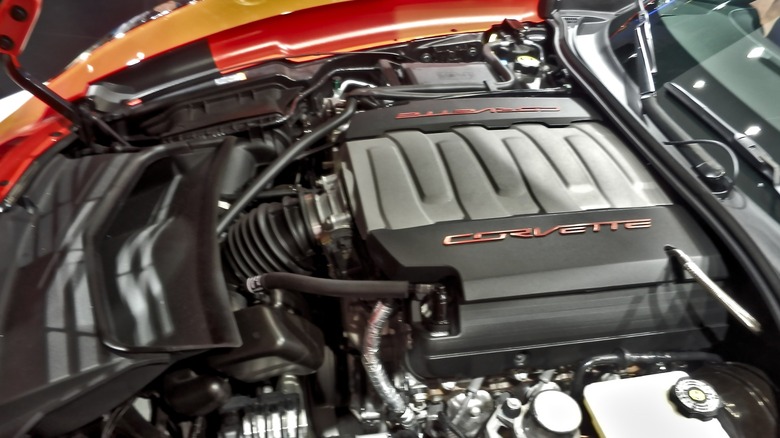These Are The Chevrolet Corvette Years You Should Avoid (According To Reviews)
No one really buys a Corvette based on its reliability. However, Chevrolet's premium sports car should, theoretically, provide above-average performance in all areas across the board. Some Chevy Corvette generations are better than others for various reasons. For instance, C1 Corvettes are desirable to collectors due to their historic significance and early-1980s 'Vettes suffered from malaise era powertrain restrictions.
Overall, the Chevrolet Corvette carries good resale value among classic car collectors and modern supercar enthusiasts alike. However, it's important to carefully consider your options before purchasing a used Corvette. The decision can get tricky, however, as sometimes the coolest Corvette models, according to car lovers, can also be among the model years you should avoid.
In addition to previous SlashGear analysis, we'll consider owner reviews and input from other automotive critics to determine some of the Chevrolet Corvette years you should avoid. We'll primarily look at Corvettes produced during the last 20 years, since going beyond that puts us into classic car territory where values can depend largely on condition, scarcity, and the buyer's willingness to correct existing problems.
The 2017 Corvette (and several years around it) should be avoided
The C7 Corvette generation spanned the last half of the 2010s, with model years ranging from 2014 through 2019. CarComplaints received the highest number of owner-reported issues for 2015, 2016 2017, and 2019 C7 Corvettes. In fact, CarComplaints ranks the 2017 Chevrolet Corvette as the worst Corvette model year ever produced, citing wheel and hub problems as the model year's worst category.
The most common complaint stems from cracked rims that occur with an average of 12,374 miles of use. CarComplaints gives the 2017 Corvette's wheel problems a 10-out-of-10 on its Severity Rating scale. The wheel issue began in 2015, somehow skipped 2018, and returned for 2019 before it was seemingly resolved for 2020 and newer 'Vettes.
Car and Driver purchased a 2017 Corvette Grand Sport for long-term testing and suffered three bent wheels in the first 6,500 miles. While two wheels were repairable, the third was cracked, requiring replacement. An encounter with a pothole busted another wheel. Then two more bent wheels were diagnosed as the cause of highway-speed vibration at the car's 30,000-mile scheduled service, one repaired and the other replaced. At around 34,000 miles, all four of the 2017 Corvette's wheels required straightening. If you're keeping count, that's seven bent wheels repaired and three more that required replacement. Wheel troubles cost Car and Driver $4,098 during the 40,000-mile test of its 2017 Corvette Grand Sport, albeit the pothole incident wasn't necessarily the result of a faulty wheel.
2014 and 2015 Chevrolet Corvette powertrain woes
While it's not uncommon for the first couple of years of any vehicle generation to experience higher rates of owner complaints, as a supercar, one aspect where we'd expect the Chevy Corvette to excel is its powertrain. Wheel and hub issues began to appear on the list of owner complaints in 2015. However, transmission problems were the most significant problem for the 2015 Corvette. Owner complaints mention transmission shuddering at 35 to 45 mph, jerking and lunging in low gear when coming to a stop, and complete transmission failure.
The 2014 Chevrolet Corvette Stingray, another Car and Driver long-term test subject, also received a number of owner complaints about its powertrain. Other than the 2018 model year, 2014 Corvettes received the fewest number of C7 owner complaints at CarComplaints, but engine failures due to reports of metal shavings in the new LT1 engine's oiling system are concerning. In addition to 2014 being the first C7 Corvette year, it was also the inaugural year of the LT1 V8 under its hood.
In addition to owner reports of metal shavings in the LT1's oil system, Car and Driver's 2014 Corvette experienced LT1 engine failure at 6,000 miles. At the time, GM pointed to metal debris as the likely cause, possibly originating at the oil filter, ultimately destroying a connecting rod bearing.


